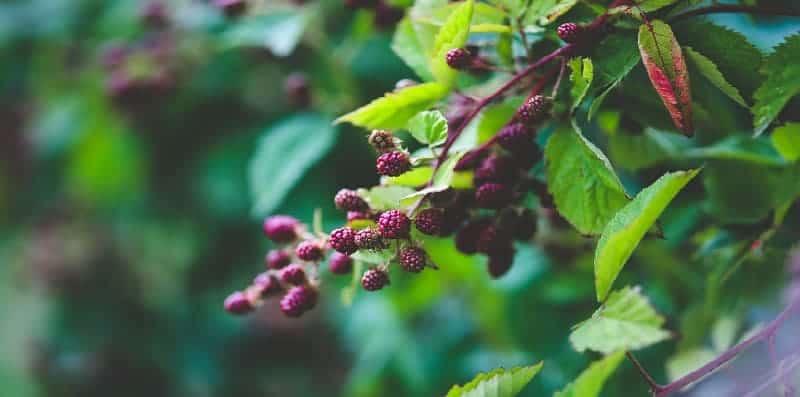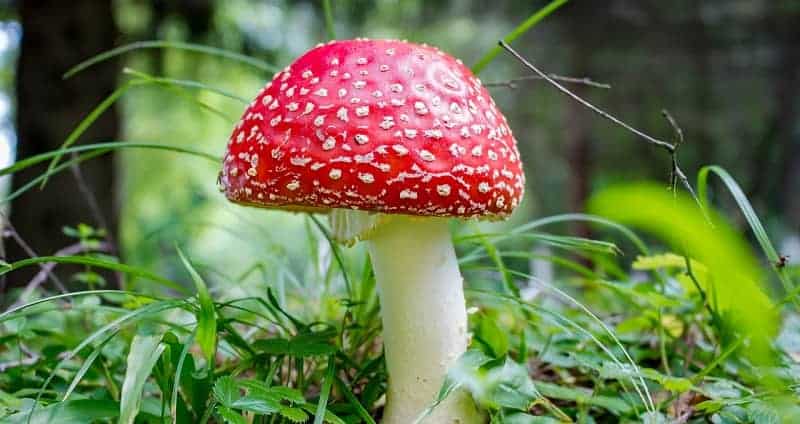[ad_1]
I’ve already got survival food packed in my Bug Out Bag, but I also know that it is going to run out quickly.
That is why one of the most important survival skills to know is being able to tell if a plant is edible.
In the ideal world, we’d all get copies of edible plant field guides and learn every single plant in them. But this just ain’t gonna happen.
Even if my memory was good enough to remember all of the edible plants, putting this knowledge to use in survival situations is a lot harder.
Lots of edible plants resemble poisonous ones (especially the case with mushrooms), so going on visual ID just isn’t going to cut it.
I’m not saying that you shouldn’t memorize edible plants (start with these ones) – but you should also learn the Universal Edibility Test too.
The Universal Edibility Test

The Universal Edibility Test is a series of steps you take to determine whether a plant is poisonous or safe to eat.
The idea of the steps is to gradually expose your body to the plant and see if any reaction occurs.
This way, if the plant is poisonous, you won’t get it in a high dose and any negative effects will be minimal.
Notes:
- In a survival situation, you’d probably be better off eating bugs for survival instead of plants. Most insects are edible and highly nutritious.
- Never eat wild mushrooms that you can’t identify with 100% confidence. The risk is too high. You could end up with diarrhea (which would dehydrate you, amongst other problems), hallucinating, or dead. Don’t risk it!
Step 1
For the Universal Edibility Test to work, you must first fast for 8 hours. This means you have eaten nothing and drank nothing but purified water.
But, if you are in a situation where you have to eat unknown plants, then this will probably be the case.
Step 2
Cut the plant up into its parts:
- Leaves
- Stems/stalks
- Roots
- Flowers
- Seeds
The reason for doing this is because some parts of a plant may be edible whereas others are not or are even poisonous.
For example, rhubarb stalks are edible whereas the leaves are toxic. You have to test each plant part individually for the Edibility Test to work.
Step 3
Rub a plant part onto your skin to see if there is a reaction. Make sure that you are crushing the stalks and roots so the juices get onto your skin. If no reaction occurs within 8 hours, then you can continue with the next step (yes, the Universal Edibility Test takes a while).
Note that the Universal Edibility Test isn’t foolproof. For example, stinging nettles will cause a reaction when they touch your skin – but they are also one of the most well-known wild edible plants and highly nutritious. You’ve just got to cook the nettles first.
Step 4
If possible, cook a small portion of the plant parts. You can also test them raw, but it is generally better to cook the plants. Read this post about how to cook without electricity.
Some plants are poisonous when raw but safe to eat when cooked.
Also, it is generally better to eat plants cooked because they can be hard on your digestive system if eaten raw (especially the case with roots and tubers).
More on wild edible roots.
Step 5
Put a small portion of the cooked or raw plant against your lips. Hold it there for at least 3 minutes.
If the plant causes any sort of reaction (such as swelling or a tingly feeling), then do not continue with it.
Step 6
Put the small plant portion into your mouth. Do not eat it or chew it! Just let it sit on your tongue and see if any reaction occurs.
You will need to hold the plant in your mouth for 15 minutes. This is going to be very difficult to do (especially while you are ravenous with hunger), but it is crucial to make sure that the plant is safe to eat.
Step 7
Now you can chew the plant, but do not swallow it yet. Ideally, you need to chew it for 15 minutes without swallowing. Again, this is going to be very difficult if you are ravenous with hunger.
Also, the plant will get so small that it will be hard not to swallow it. Do your best – your survival depends on it!
Step 8
Now you can swallow the small piece of plant that you’ve been chewing. You will have to wait 8 hours after eating this small piece of plant to see if any bad reactions occur.
Step 9
If you don’t have any bad reactions after eating a small piece of the plant, you can now eat about ¼ cup of the plant. You will need to consume it in the same way you did in step 8—cooked or raw.
Step 10
Wait another 8 hours. If you don’t have a bad reaction from eating the plant, consider it safe to eat. If you feel sick, get a rash, or have another bad reaction, then you must wait 8 hours before staring the test over with a new plant.
Which Plants to Test?

The Universal Edibility Test takes a long time to perform (over 24 hours when you include the fasting period). So you don’t want to waste your time doing the test on plants that are likely poisonous.
In addition to learning edible plants, I’d suggest that you take some time to learn deadly plants. Here is our article about wild foraging.
General guidelines as signs that a plant is probably poisonous and not safe to eat:
- NEVER eat unknown mushrooms. It is too risky!
- Avoid plants with shiny leaves
- Never eat plants with thorns
- Avoid plants with yellow or white berries (poisonous berry guide)
- Avoid plants which a white or yellowish sap
- Avoid plants that have seeds in a pod
- Avoid plants that have a soapy taste
- Avoid umbrella-shaped plants or plants with umbrella-shaped flowers
These rules don’t always apply and you might rule out some plants which are actually safe to eat (much in the way that the Universal Edibility Test would rule out stinging nettles).
But it is better to play it safe and rule out some safe plants than risk eating a poisonous plant. This is your survival we are talking about!
If you aren’t in a life-or-death situation, then don’t eat plants you don’t know. Get a guidebook or consult an expert before eating any new plants!
How many wild edible plants do you know?
[ad_2]
Source link
